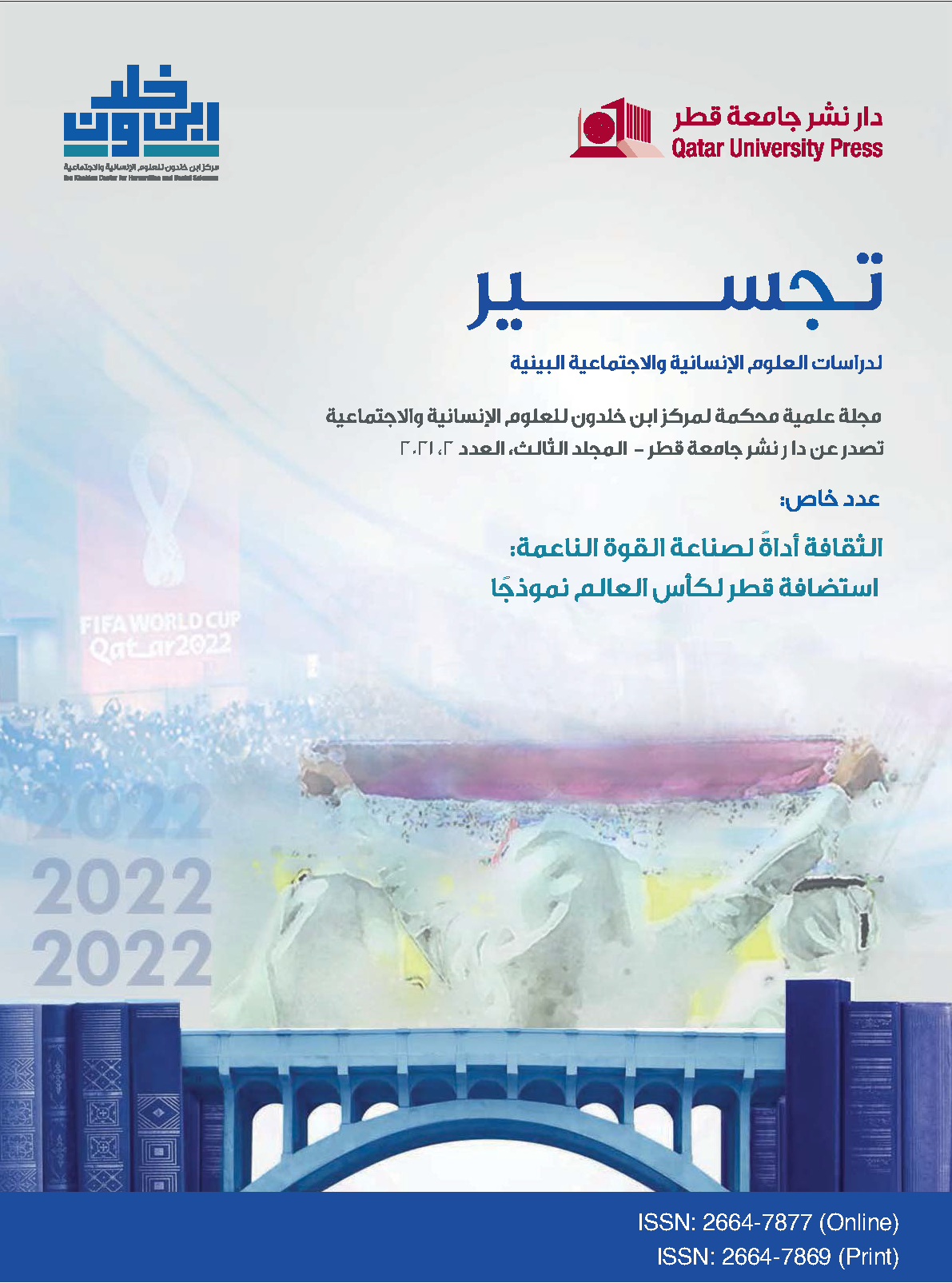القوة الناعمة وكأس العالم 2022: الاستفادة من التجارب السابقة في استضافة الفعاليات الرياضية الضخمة
الملخص
تُظهر التجارب السابقة لاستضافة الفعاليات الرياضية الضخمة مثل الألعاب الأولمبية وكأس العالم أن هناك عديد الطرق التي يمكن أن تسهم فيها هذه الاستضافة في تمكين القوة الناعمة للدول المستضيفة من عدمه. بالاعتماد على طيف من الأدبيات السابقة، تستخدم هذه الورقة تجارب القوى الناعمة لستة دول قامت بتنظيم كأس العالم أو الألعاب الأولمبية منذ 2008. وتتضمن هذه التجارب كُلًّ من الصين (الألعاب الأولمبية بيجين 2008)، وجنوب أفريقيا (كأس العالم 2010)، والمملكة المتحدة (الألعاب الأولمبية بلندن 2012)، والبرازيل (كأس العالم سنة 2014 والألعاب الأولمبية سنة 2016 في ريو ديجانيرو)، وروسيا (الألعاب الأولمبية في سوشي 2014 وكأس العالم سنة 2018)، واليابان (الألعاب الأولمبية 2020 في طوكيو). تعتمد هذه الورقة مقاربة لكأس العالم 2022 الذي تنظمه قطر من خلال تطبيق وتكييف تجارب الاستضافات السابقة لفهم أوجه تمكين القوة الناعمة للدولة المستضيفة من عدمه. التحديات الدولية حول وضعية العمالة المهاجرة في قطر، ونوعية القيم الإسلامية والثقافية السائدة في قطر والمختلفة عن الجمهور الغربي، سوف تستمر في تحدّي الإدارة والسمعة الدولية لتنظيم قطر للمونديال. ومع ذلك، فإن استمرار قطر في التزامها بتنظيم هذه الفعالية بالمعايير الأكثر صداقة للبيئة، والحضور الدائم في حقل كرة القدم الدولية من خلال الرعاية، والتملك، والفوز في البطولات الرياضية العالمية، بالإضافة إلى البحث الدائم عن تعزيز وتحسين وضعية الدولة، سيساعد البلد في تحقيق مساعي التمكين في مرحلة ما قبل تنظيم الفعالية. وتعهد البلد وتفانيه في خلق إرث دائم بعد ديسمبر 2022 سيعين على تمكين البلد في مرحلة ما بعد تنظيم الفعالية.
المقاييس
##plugins.themes.bootstrap3.article.details##
القوة الناعمةالفعاليات الرياضية الضخمةكأس العالمالألعاب الأولمبيةقطرالدبلوماسية الرياضية
Brannagan, P.M. and Giulianotti, R., Soft Power and Soft Disempowerment: Qatar, Global Sport and football’s 2022 World Cup finals, Leisure Studies, Vol. 34, No. 6, (2015): pp. 703-719.
Buarque, Daniel. One Country, Two Cups- The International Image of Brazil in 1950 and in 2014: A Study of the Reputation and the Identity of Brazil as Projected by the International Media During the Two FIFA World Cups in the Country. International Journal of Communication Vol. 9 (2015): pp. 1300-1318.
Burchell, Kenzie; O’Loughlin, Ben; Gillespie, Marie; and McAvoy, Eva Nieto. Soft power and its audiences: Tweeting the Olympics from London 2012 to Sochi 2014. Journal of Audience and Reception Studies Vol. 12, No. 1 (May 2015): pp. 413-437.
Desaia, Ashwin, and Vahed, Goolam. World Cup 2010: Africa’s turn or the turn on Africa? Soccer & Society Vol. 11, No. 1 (January–March 2010): pp. 154–167.
Dubber, John. Playing the Game: The soft power of sport. British Council. October 2015.
Eisenstadt, S. N. Multiple Modernities. Daedalus Vol. 129, No. 1 (2000): pp. 1-29.
Giulianotti, Richard. The Beijing 2008 Olympics: Examining the Interrelations of China, Globalization, and Soft Power. European Review Vol. 23, No. 2 (May 2015): pp. 286-296.
Grix, Jonathan and Kramareva, Nina. The Sochi Winter Olympics and Russia’s unique soft power strategy. Sport in Society (2015), pp. 1-15.
Grix, Jonathan, and Houlihan, Barrie. Sports Mega-Events as Part of a Nation’s Soft Power Strategy: The Cases of Germany (2006) and the UK (2012). The British Journal of Politics and International Relations Vol. 16 (2014): pp. 572-596.
Lee, Kwang-Hoon and Chappelet. Jean-Loup. Faster, Higher, “Softly” Stronger: The Impact of Soft Power on the Choice of Olympic Host Cities. The Korean Journal of Policy Studies Vol. 27, No. 3 (2012): pp. 47-71.
Leheny, David. The Contents of Power: Narratives and Soft Power in the Olympic Games Opening Ceremonies. Economic Research Institute for ASEAN and East Asia, No. 294 (June 2019).
Martin, Alex. Can Tokyo's soft power push ensure a positive Olympic legacy? The Japan Times. January 2, 2020.
Morales, D. E. (2013). Inside the BRIC: Analysis of the Semiperipheral Character of Brazil, Russia, India and China. Austral: Brazilian Journal of Strategy & International Relations Vol. 2, No. 4, (2013), pp. 141-173.
Murakami, Sakura. Hashimoto resigns from cabinet to become head of Tokyo Olympic committee. Japan Today. Feb. 18, 2021.
Nye, Joseph. Soft Power and Beijing Olympics. Harvard Kennedy School Belfer Center. August 24, 2008.
Nye, Joseph. Soft Power. Foreign Policy, No. 80 (Autumn 1990): pp. 153-171.
Panja, Tariq, and Draper, Kevin. U.S. Says FIFA Officials Were Bribed to Award World Cups to Russia and Qatar. The New York Times. April 6, 2020.
Pellitteri, Marco. Japan’s Soft Power and “Grand Fictions” in Global Venues. Kritika Kultura, Vol. 32 (2019): pp. 453-481.
Pulleiro, Carlos. The International Legacy of Sports Mega-events in Brazil: Political and Economic Lessons for the Semi-peripheral Countries. Papel Politico Vol. 25, (June 29 2020): pp. 1-17.
Schausteck de Almeida, Bárbara; Júnior, Wanderley Marchi; and Pikec, Elizabeth. The 2016 Olympic and Paralympic Games and Brazil’s soft power. Contemporary Social Science Vol. 9, No. 2 (2014): pp. 271–283.
Soares e Castro, Andreia. “The 2018 FIFA World Cup: The Gains and Constraints of Russia’s Soft Power of Attraction Through Football and Sports. Rising Powers Quarterly, Vol. 3, No. 3 (2018): pp. 17-37.
Swart, K., & Bob, U. The seductive discourse of development: The Cape Town 2004 Olympic bid. Third World Quarterly, Vol. 25, No. 7, (2004): pp. 1311-1324.
Zhongying, Pang. The Beijing Olympics and China’s Soft Power. The Brookings Institution. September 4, 2008.
World Muslim body lends support to Qatar over 2022 World Cup. Reuters. June 18, 2015.


